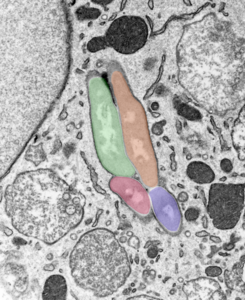Researchers at the Francis Crick Institute have discovered that the process of removing old and damaged cell parts, known as autophagy, could be used to combat intracellular infections like tuberculosis (TB). The team engineered human immune cells and found that when these cells were able to perform autophagy, the bacteria causing TB were destroyed. Boosting the autophagy pathway could be a new strategy for addressing antibiotic resistance, making existing antibiotic drugs more effective, or presenting an alternative to drugs in cases where bacteria have developed resistance. Targeting the autophagy pathway in macrophages alone is crucial to ensuring the safe increase of autophagy in the location of infections, as all parts of the body use autophagy as a way to recycle old and damaged cells. The study’s findings have significant implications for the development of new treatments that could be effective against a range of intracellular infections.
Boosting the Immune System May Help Reduce Reliance on Antibiotics for Infections like TB
Researchers from the Francis Crick Institute have discovered that the process of removing old and damaged cell parts from the body is crucial in fighting off infections that take root in our cells, including tuberculosis (TB). The team’s findings suggest that this natural process, called autophagy, can be harnessed using new treatments, which could either replace or enhance the effectiveness of antibiotics, especially in cases where bacteria have developed resistance to existing drugs.
The study, which was published in the journal Nature Microbiology on March 23, 2023, focused on genes that are vital to the ability of bacteria to evade autophagy, a pathway used by cells to destroy themselves when under stress or infection. To test their theory, the researchers used human immune cells known as macrophages, which were engineered from induced pluripotent stem cells. Using genome editing tools, they altered the macrophages’ ability to perform autophagy by removing specific genes.
When the cells were infected with Mycobacterium tuberculosis, which is responsible for TB, the bacterial infection was able to take hold and replicate further within the cells. However, when the cells were able to perform autophagy, the bacteria were destroyed, and the cells remained intact. These results indicate that autophagy plays a crucial role in controlling intracellular infections like TB.
The findings suggest that boosting or strengthening the autophagy pathway could be a new strategy for addressing antibiotic resistance. By making existing antibiotic drugs more effective or presenting an alternative to drugs in cases where bacteria have developed resistance, boosting the immune system’s defense with a host-directed therapy could be a valuable new tool in the fight against infections.
According to Max Gutierrez, head of the Host-Pathogen Interactions in Tuberculosis Laboratory at the Crick, immunotherapies have already harnessed the immune system to fight cancer, and now, boosting the immune system’s defense with a host-directed therapy could be a valuable new tool in the fight against infections, particularly those becoming resistant to antibiotics.
The team’s findings hold promise for the development of new treatments that could be effective against a range of intracellular infections, including TB. As the global threat of antibiotic resistance continues to grow, the ability to harness the power of the immune system could prove to be a critical tool in the fight against infectious diseases.
Boosting Immune System Can Help Tackle Antibiotic Resistance in Infections like TB, Reveals Study
A recent study by researchers at the Francis Crick Institute has revealed that the body’s process of removing old and damaged cell parts, known as autophagy, can help fight infections that take root within our cells, including tuberculosis (TB). The study, published in the journal Nature Microbiology, suggests that by harnessing this natural process, which is used by cells to destroy themselves under stress or infection, it may be possible to develop new treatments to either replace or enhance the effectiveness of antibiotics, especially in cases where bacteria have developed resistance to existing drugs.
To validate their results, the team used macrophages isolated from blood samples to confirm the significance of autophagy in human defences. The team also engineered human immune cells called macrophages from specialist stem cells called induced pluripotent stem cells and manipulated their ability to perform autophagy. They then infected these cells with Mycobacterium tuberculosis, which causes TB, and observed that when the cells were able to perform autophagy, the bacteria were destroyed, and the cells remained intact.
The researchers found that boosting the autophagy pathway could be a new strategy for addressing antibiotic resistance. By making existing antibiotic drugs more effective or presenting an alternative to drugs in cases where bacteria have developed resistance, it could be a valuable new tool in the fight against infections. However, targeting the autophagy pathway to boost it in a safe and targeted way is not as simple as it seems since all parts of the body use autophagy as a way to recycle old and damaged cells. Therefore, in order to safely increase autophagy in the location of infections, the pathway needs to be targeted in macrophages alone.
The study’s findings have significant implications for the development of new treatments that could be effective against a range of intracellular infections, including TB. As the threat of antibiotic resistance continues to grow, the ability to harness the power of the immune system could prove to be a critical tool in the fight against infectious diseases.
In conclusion, targeting the autophagy pathway in macrophages could present an alternative to or improve the effectiveness of antibiotics, especially in cases where bacteria have developed resistance to existing drugs. The team is now planning to screen for drug compounds that could be used to boost autophagy in a safe and targeted way.
Don’t miss interesting posts on Famousbio










